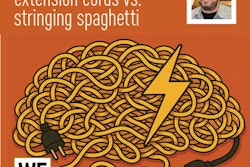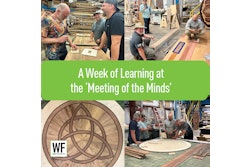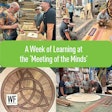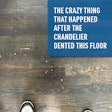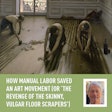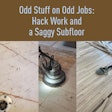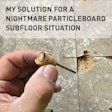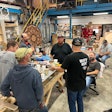Kevin Mullany has apparently touched a nerve with his recent article "Inspections Are Supposed to Help Our Industry, Not Hurt It." It is a compelling, multi-faceted topic. So here goes a toboggan run down a slippery slope. Full speed ahead.
Inspectors and inspections are necessary components of the construction industry for dealing with disputes. Inspection has been part of the softwood and hardwood lumber industries for more than 100 years. Let's take few moments to look at the ultimate inspection/inspector organization in North America, the NHLA (National Hardwood Lumber Association). The NHLA Inspector Training School, founded in 1948 in Memphis, offers a very rigorous and intensive 14-week hardwood lumber inspection course. The graduates are actually qualified to inspect hardwood lumber in accordance with NHLA Rules Book. If you don't meet the performance standards, you don't graduate. I copied the following from the NHLA web site:
NHLA is an exclusive provider of unique services to the hardwood industry. NHLA employs a full time staff of highly skilled lumber inspectors in the United States and Canada. The National Inspectors are overseen by the NHLA Chief Inspector who is headquartered in Memphis, Tennessee. The main objective of the Chief and his staff is to maintain order, structure and ethics in the hardwood marketplace.
Imagine this concept—a rigorous training program for the hardwood lumber industry that is further supported by a select group of "highly skilled lumber inspectors" who are "overseen by the NHLA Chief Inspector who is headquartered in Memphis, Tennessee." The NHLA Grading Rules are administered in a fair and unbiased manner. Like Caesar's wife, beyond reproach or suspicion.
Let's move down the food chain and look at another approach to inspections and inspectors. An alphabet soup of organizations offer certifications based on two- to four-day training seminars. Many of these organizations actually provide inspection services to floor covering manufacturers and distributors. They are brokers and dole out the inspections to local inspectors. They charge their manufacturer and distributor customers for each inspection, then pay the individual inspector less than they get paid. It's a numbers game, like selling cow manure. They are managing the cow manure transaction for the claims department at the manufacturer. The more manure you throw around, the more you get paid.
Some of the manufacturers and inspection service providers require "third-party" certifications. These third-party certifications can be obtained by attending any of the "approved" training events. This is a longstanding practice in the carpet and vinyl business. As agents from the carpet and vinyl business have infiltrated the wood flooring industry, it is only natural that this approach to inspections would also come along for the ride. (I was going to add "like a flea or tick on the family dog," but that would be harsh.)
Does the certifying organization guarantee the accuracy of the certified professionals output, and is this certification like a license? Or does certification actually serve as a substitute for real experience and education and competence? Is the training offered educational or is it indoctrination designed to develop methods for settling complaints quickly and at minimal cost? And finally, how does the law of supply and demand figure into this equation? Let's work through these questions one at a time.
Does the certifying organization guarantee the accuracy of the certified professionals output, and is this certification like a license?Unlikely, because without clearly written standards and a practical mechanism for review and enforcement, how can any claim of accuracy be substantiated. To be honest, many of the people offering training and certifications are not sufficiently experienced and educated to train others. Self confidence, effective marketing and a good website are not qualifications or reasonable substitutes for real-world experience and education in the chosen field.
Or does certification actually serve as a substitute for real experience and education and competence?There are some very good certified wood flooring inspectors out there. Unfortunately, not very many. In many instances you might be better off buying a can of alphabet soup to look at your wood floor. At the end of the day, you would not have been given bad information by someone with a series of vowels and consonants on their business card, and you would have a hot bowl of soup to enjoy.
Is the training offered educational or indoctrination designed to develop methods for settling complaints quickly and at minimal cost?There is nothing inherently bad about indoctrination or settling complaints quickly at the lowest cost. But when you don't differentiate between indoctrination and education, that is a potential problem. Collecting data properly and correctly analyzing it is not a simple task. It is not forthcoming to represent that the inspector is a disinterested and unbiased third party when the inspector's primary role is to act as the manufacturer's agent to provide evidence to deny a claim.
And, finally, how does the law of supply and demand figure into this equation?Scarcity increases prices, and when you increase the available supply of any service or commodity, prices generally decrease. If you increase the number of service providers, the unit cost of the service will decline. The most effective method of creating more inspectors is to make it easier to be an inspector. More inspectors = lower unit cost per inspection.
The current wood floor inspector certification system has:
- Provided credentials for individuals who are not necessarily competent.
- Created confusion regarding credentials so that purchasers of inspection services are not aware of the potential of hiring unqualified individuals.
- Flooded the market with an over-supply of inspectors, which has driven down the unit price of inspections.
- Not provided any incentives for individuals to acquire costly and time-consuming education and experience to increase the quality of inspection services.
The model for cleaning up this inspection mess is clearly before us in the living example provided by the NHLA Inspection Department.
"Anything worth doing is worth doing right." - Wm. Brickman 1913-1992















